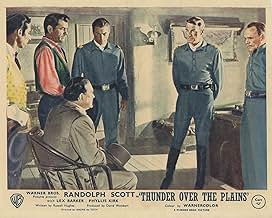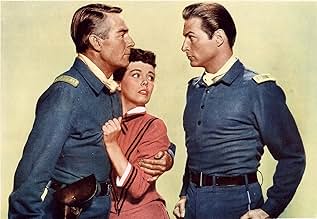Aggiungi una trama nella tua linguaIn Post-Bellum Texas, an army captain tries to keep the peace between overtaxed, impoverished farmers and greedy carpetbaggers.In Post-Bellum Texas, an army captain tries to keep the peace between overtaxed, impoverished farmers and greedy carpetbaggers.In Post-Bellum Texas, an army captain tries to keep the peace between overtaxed, impoverished farmers and greedy carpetbaggers.
- Regia
- Sceneggiatura
- Star
- Hodges' Sergeant
- (non citato nei titoli originali)
- Texan
- (non citato nei titoli originali)
- Walter Morgan
- (non citato nei titoli originali)
- Trooper
- (non citato nei titoli originali)
- Texan
- (non citato nei titoli originali)
- Kehoe
- (non citato nei titoli originali)
Recensioni in evidenza
Randolph Scott is a Union army captain, but also a Texan and he sees both sides. Henry Hull is his put upon commanding officer and Charles McGraw plays a leader of a local gang who have risen up like Robin Hood among the oppressed. These guys aren't Ku Klux Klan nightriders by any means though.
Our villains are Hugh Sanders and Elisha Cook, Jr. a pair of scurvy lowlifes if there ever were. They've got quite the little self perpetuating racket. The more they extort, the more McGraw raids, the more Sanders and Cook cry that the army has to stay in Texas. Just about anything is blamed on McGraw and his men.
There's also a domestic crisis of sorts with newly arrived captain Lex Barker, an arrogant sort who was on duty in Washington and would like to get back there. Barker's bored and he makes a play for Phyllis Kirk who is married to Randolph Scott. Since they don't like each other from the beginning that only increases the problem.
Andre DeToth who did several westerns including a few with Randolph Scott brought home a good one here. With themes like an attempt at adultery here, this was not a western for the Saturday matinée kiddie trade. DeToth's best in my opinion is one called Ramrod with Joel McCrea and his then wife Veronica Lake, but this one is pretty good too.
DeToth also learned from the best and the final shootout scene with Scott against four men bears no small resemblance to High Noon, released a year earlier.
Definitely one of Randolph Scott's best westerns of the Fifties.
Tale set in post Civil War Texas where carpetbaggers ruled almost supreme, and the occupying Federal troops seemed to let them. There's a gang of patriotic outlaws led by a Robin Hood character trying to redress the balance and a complicated set of sympathies and antagonisms with which to contend. And Lex Barker was playing a nutter. But if I correctly remember my extensive Frank Yerby reading when I was a kid surely in reality the Ku Klux Klan couldn't have been far away in matters of this kind in their role of Southern saviours? There's time in this shortish formula fiction film for lots of plot twists, cold business, love, jealousy, rage, backstabbings, murders galore, some honour and integrity, all of it delivered with plenty of panache, a nice colour and sporadically excellent camera-work.
It's enjoyable hokum up to a point but ultimately loses its way because there's no one you can really root for but many you can root against. Naturally, Scott is as dependable as usual.
Scott never looks unbelievable in his part.
Lex Barker, former Tarzan and later superman "Old Shatterhand", plays against his image as arrogant villain. And I think he does it very well.
The story is entertaining and there are a lot of other good actors like Henry Hull, Phyllis Kirk and Elisha Cook jr. in it.
This really is an enjoyable B-western directed by veteran Andre de Toth.
When the north defeated the south during the civil war, unfair practices were being exercised when southern farmers were unfairly overtaxed as opposed to regular farmers living in the north, forcing some to give up land easily belonging to them by auction. Fictionalize story line based on fact that if there is any reason to watch this film, it would only be for the history lesson. The action is not a plenty, but well- known Western actor Randolph Scott's tall, valiant screen presence keeps the film from becoming boring. This is the fourth of six movies Randolph Scott collaborated with director Andre De Toth.
Lo sapevi?
- BlooperGrowing cotton and transporting cotton bales thru the hilly countryside was a foolish director's scheme. In 1869 cotton wasn't grown within 1,000 miles of this area.
- Citazioni
Norah Porter: Whatever became of Frances Bilky?
Captain Bill Hodges: I don't know. She married a colonel, I think. Maybe it was a general. At any rate, she outranks all of us.
Norah Porter: But that's wonderful! Now she'll have her lifelong ambition to lead the cotillion. Well, I guess that's what I always wanted too.
Captain Bill Hodges: You don't have anything like that around here, do you, Captain?
Captain David Porter: Oh, I don't know. The Indians come down once a month and dance for us.
- ConnessioniReferenced in Radiografia di un colpo d'oro (1968)
I più visti
- How long is Thunder Over the Plains?Powered by Alexa
Dettagli
- Tempo di esecuzione
- 1h 22min(82 min)
- Proporzioni
- 1.37 : 1





































